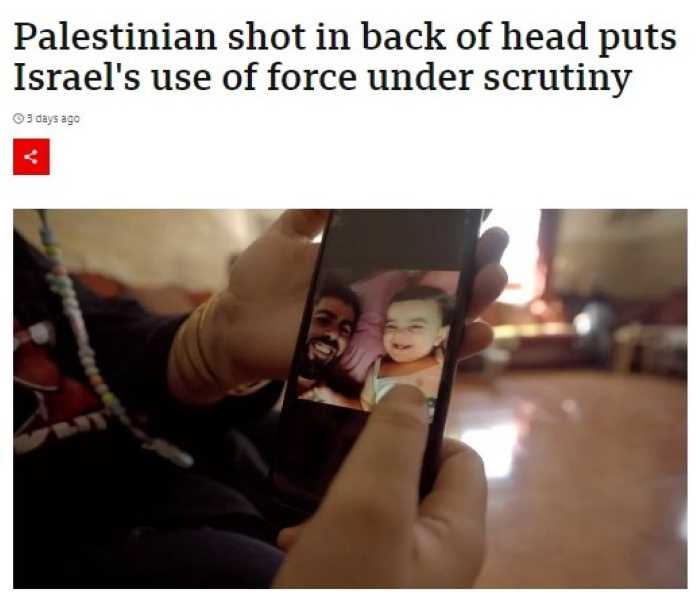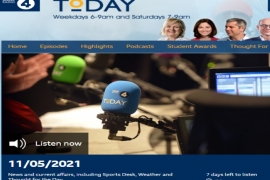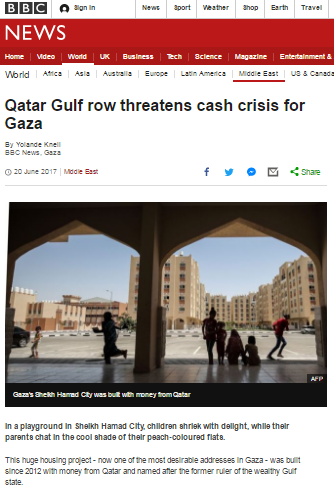September 2nd saw the appearance of a report by the BBC Jerusalem bureau’s Tom Bateman on the BBC News website’s ‘Middle East’ page which was promoted (also on social media) as follows:
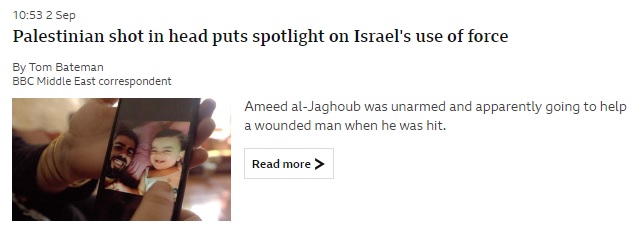
The report itself is headlined ‘Palestinian shot in back of head puts Israel’s use of force under scrutiny’ and it relates to an incident which took place on August 22nd during an arrest operation following the terror attack in Huwara three days earlier. As reported by Israeli media outlets, that incident – which took place during rioting by Palestinians in the town of Beita – is under investigation by the Police Internal Investigations Department.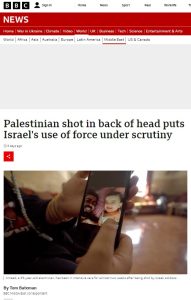
Tom Bateman opens his report with a description of “mobile phone footage” allegedly showing the shooting of Ameed al-Jaghoub. The source of that footage is not identified by Bateman and readers are not given any information on the topic of what al-Jaghoub had been doing before the filming began or why he was at that particular location at the time, beyond the following statement which appears later in the report:
“Residents threw stones and broken masonry at armoured troop carriers as they entered. Witnesses told the BBC that Israeli paramilitary border police officers exited a jeep that had stopped at the top of the street where Mr Jaghoub had joined a crowd of young men and teenagers.” [emphasis added]
Bateman’s report repeatedly states that al-Jaghoub was “unarmed” at the time and was “rushing to help a wounded man” when he was shot without providing any evidence to support those claims.
The report is based on statements from mostly anonymous “witnesses” and from al-Jaghoub’s family. In addition, Bateman amplifies talking points made by “human rights groups”:
“His case is the latest to be highlighted by human rights groups, who say that casualty rates from what they describe as “unjustified” use of force are at their highest in two decades. […]
The group Human Rights Watch has called for an international response to Israel’s use of lethal force in the West Bank [photo caption]”
Later in the report he brings up a topic unrelated to the August 22nd arrest operation:
“Beita found itself at the heart of the West Bank’s escalating violence in May 2021, when an Israeli settler group established the nearby outpost of Evyatar, cutting off the Palestinian village from part of its lands.
The settlers built the outpost in apparent retribution for the murder of Yehuda Guetta, a 19-year-old yeshiva student, who was shot dead by a Palestinian-American who came from a town 20km (12 miles) away from Beita.
All settlements are illegal under international law, although Israel disputes this. But outposts like Evyatar, which often involve taking privately-owned Palestinian land, are also illegal under Israeli law.”
As was noted here in October 2021 when Bateman’s colleague Yolande Knell reported from Beita:
“…the unrecognised outpost was first set up in 2013 following the murder of Evyatar Borovsky (after whom it was named) at the nearby Tapuach Junction […] it was soon evacuated by the Israeli military authorities. In early May 2021, following the murder of 19-year-old Yehuda Guetta at the same location (which at the time was barely mentioned by Knell and her colleagues), an attempt was made to re-establish the outpost and two months later an agreement was reached for its evacuation.”
Bateman goes on to amplify talking points from B’tselem with no prior clarification of that NGO’s “affiliations, funding and particular viewpoints” as required by BBC editorial guidelines on impartiality.
“In the year after Evyatar’s establishment, Israeli forces killed nine Palestinians, eight of them from Beita, during weekly protests against the outpost, according to the Israel-based human rights group B’Tselem.
The village has already “paid a massive price” for the growth of illegal settlement outposts in the Nablus region, says Sarit Michaeli, international advocacy officer at the organisation.”
Notably, readers are not informed of the violent – and racist – nature of those “weekly protests” in Beita before Bateman continues:
“Likening it to the demonstrations around Beita, she puts Mr Jaghoub’s shooting down to the use of “open fire regulations” by Israeli forces.
“It’s important to stress this is not an isolated incident… We’re talking about a broad policy that is the use of lethal force,” she says.
“The fact that some people were throwing stones [and] the claim that soldiers or border police officers were involved in some sort of clash with Palestinians doesn’t simply allow them the authority to shoot an unarmed person in the head,” she said.
Under international law, the use of firearms by security forces against civilians is defined as a measure of last resort and can only take place to stop an “imminent threat of death or serious injury”.”
Clearly the aim of this report by Bateman about an incident that is still under investigation (and which both he and his colleagues had already mentioned in previous reporting) is to promote NGO talking points concerning “the use of force” by Israeli security forces.
Visitors to the BBC News website have already seen similar amplification of such messaging from political NGOs – some linked to terrorist organisations – by Bateman in recent months: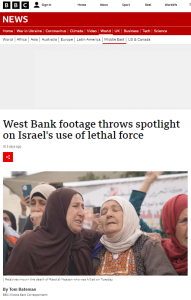
BBC’S TOM BATEMAN PROMOTES THE NARRATIVE OF DESIGNATED NGOS
LOOKING BEHIND BBC REPORTING ON THE DEATHS OF PALESTINIAN TEENS
BBC’S BATEMAN PROMOTES PFLP LINKED NGO YET AGAIN
BBC JERUSALEM BUREAU REPORTER COMMENDED BY ‘ELECTRONIC INTIFADA’
Bateman closes his report with some remarkable punctuation:
“Israel routinely rejects the accusations by rights groups, saying its forces operate to protect Israeli civilians and lethal force is necessary against what Prime Minister Benjamin Netanyahu has called a current “terror wave” in the West Bank.
At least 220 Palestinians in the West Bank and Gaza, and 33 Israelis have been killed since the start of this year.”
As has all too often been the case in BBC reporting over the past year and a half, Bateman makes no effort to inform his readers that while most of the Israelis murdered in terror attacks in 2023 were civilians (including six minors), the vast majority of the Palestinians killed in the same time period were members of terrorist organisations and/or males involved in terror attacks or violent rioting at the time.
Related Articles:
BBC’S YOLANDE KNELL PRODUCES PARTIAL REPORTING FROM BEITA
MORE TENDENTIOUS REPORTING FROM THE BBC JERUSALEM BUREAU’S KNELL

